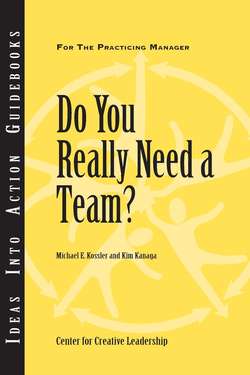Читать книгу Do You Really Need a Team? - Michael Kossler E. - Страница 9
На сайте Литреса книга снята с продажи.
ОглавлениеHow Teams Work
Teams are often temporary groups, yet they can help an organization build its long-term competitive strength by discovering new products and services, by developing new ways of serving customers and clients, and by creating new systems that enhance an organization’s efficiency.
If your organization has charged you with an important business initiative, it’s possible that you may need to form a team to address that challenge. But before you start recruiting, determine whether a team really is the best way to achieve results. For many kinds of work it’s more efficient and less expensive to have individuals or workgroups handle the job.
Teams Are Good for Complex Tasks
Teams are often the best choice for addressing complex problems and issues that affect many parts of the organization. Examples might include enterprise resource planning and implementation, a strategy for expanding the organization’s products and services into the global market, or the development of an Internet business model. Through its members, a team can represent the thinking of a broad spectrum of stakeholders and act accordingly.
Teams can also help address controversial organizational change. When an organization expects resistance to a resource realignment, for example, or to a new business initiative, teams can increase the speed at which new ideas are accepted and help spread commitment to new strategies by communicating through its members to the company’s different functional areas.
When Company X acquired Company Y, the leaders of the newly combined entity formed integration teams using members from both companies. The teams cut down on the “them versus us” mentality, chose the best elements from each organization’s processes and culture to create new business systems, and diverted employee energy away from complaining and sabotage toward constructive problem solving and cooperation.
Simple, straightforward tasks don’t demand a team. Teams seldom perform well right from the start (it takes time for people who don’t know each other and who don’t normally work together to merge their different interests and viewpoints into a team). Given that limitation, it would be difficult for you to justify the expense of setting up a team to accomplish a simple task with a short timeframe.
